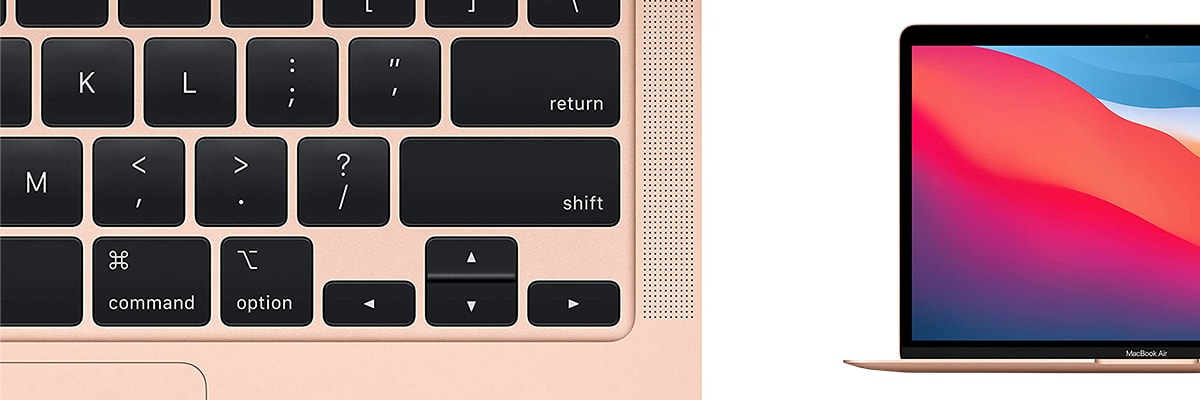
Return navigate_next
Samsung Galaxy Book Pro 360 vs MacBook Air Laptop
May 15, 2021 *
Over the last decade, Samsung and Apple have duked it out for smartphone supremacy. During that time, Samsung’s Galaxy line has thrown repeated haymakers at the iPhone in a desperate attempt to knock Apple off its digital throne.
Now, Samsung and Apple’s famous rivalry extends to the laptop market. Apple’s extremely popular MacBook Air is up against the South Korean tech giant’s newest release, the Samsung Galaxy Book Pro.
Where do these two devices stand in an already crowded field of laptops? We compare the Samsung Galaxy Book Pro 360 vs MacBook Air laptops below so you can decide for yourself which is right for you.

Galaxy Book Pro 360 vs MacBook Air Screens
Apple’s Retina display technology has been turning heads and wowing consumers ever since it was first released in the iPhone 4. The absolutely stunning images cranked out on the 2560×1600 screen are buoyed by Apple’s TrueTone technology. It senses the light in the room and adjusts the white balance on the monitor accordingly. Simply put, the 13.3-inch screen on the MacBook Air is incredible.
AMOLED technology powers the screen used in Samsung’s Galaxy Book Pro. While it may feature a lower resolution than the MacBook Air (1920×1080), the vibrant colors on display are truly remarkable. The Galaxy line of smartphones are known for their fantastic looking screens. So it’s no surprise that the Galaxy Book Pro features all of the same graphical panache that’s powered the Samsung flagship phone line for years.
Comparing the screens on these two devices is basically akin to comparing apples to apples; they both look gorgeous and the only thing that really sets them apart is the bump up in resolution found on the MacBook Air.

MacBook Air vs Galaxy Book Pro Power
A lot has been said about Apple’s new M1 chip, which may as well function as both the brain and the heart of the MacBook Air. This system-on-a-chip is the first one ever designed exclusively for a Mac, and so far it’s certainly lived up to the hype.
Featuring an 8-core CPU that Apple is quick to point out is nearly three times faster than previous generation MacBooks, the M1 chip makes editing in Final Cut Pro an absolute breeze. The integrated GPU allows users to work with 3D animation suites with ease. It is perfectly capable of handling whatever modern PC games can throw at it.
To cap it off, Apple’s 16-core Neural Engine inside the M1 utilizes machine learning to speed up tasks such as voice recognition and image processing. Simply put, the MacBook Air is a significant step up from previous generations and will be essentially future-proof for years to come.
While the Galaxy Book Pro may not be home to an all-new, custom-designed system on a chip like Apple’s device, it’s still got plenty to offer thanks to Intel. Their 11th generation Core i7-1165G7 CPU powers the Galaxy Book Pro, and its quad-core architecture allows for up to 4.1 GHz of processing power when utilizing all four cores at once. This solid Intel CPU won’t blow you away from a performance perspective, but it will certainly provide enough power for multitasking on the go.

Air vs Book Pro Battery Life And Other Intangibles
What use is a laptop if you can’t depend on the battery to get you through a busy day? Both Apple and Samsung know this is a huge sticking point for consumers, so it should come as no surprise that both the MacBook Air and Galaxy Book Pro feature batteries designed to last.
Apple promises up to 18 hours of battery life, while Samsung claims their device clocks in at 21 hours. Of course, every person uses their laptop differently, so your mileage may vary. Still, you’re almost certainly going to have no issues with either device losing battery life when you need it the most.
Since both laptops have a range of different hard drive sizes and RAM options to fit your budget, seemingly minor options might tilt some consumers one way or another. The MacBook Air weighs in at 2.8 pounds, while the Galaxy Book Pro checks in at just under 2. Apple’s device features two Thunderbolt 4 ports. In comparison, Samsung’s unit offers one Thunderbolt 4 port as well as one USB-C and one USB-3.2 port, along with a microSD reader —something that is lacking on the MacBook Air.
No matter which laptop you ultimately choose, you will want the peace of mind that comes with an extended warranty. This can be found with Upsie, which offers warranties that allow you to save up to 70% on the standard options provided by retailers. You’ll also receive extensive coverage, including protection against accidents like drops and spills. Think carefully about the cost of replacing your laptop as you determine if you should invest in an extended warranty.
Learn More About Laptop Insurance:
* This article is over 6 months old and may or may not be updated.
